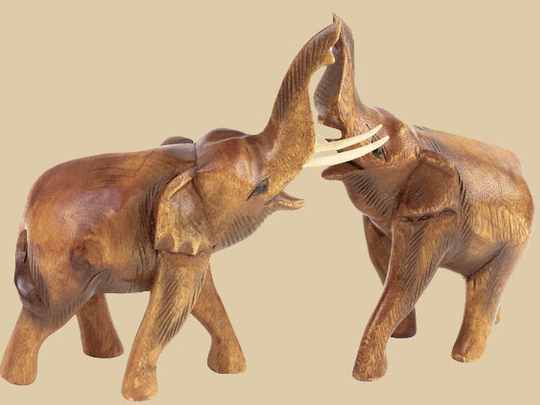
Abu Dhabi: A wonderful holiday in a beautiful country with abundant wildlife may end up in trouble, if the tourists are ignorant about an international convention. For example, a souvenir made of ivory available in an open market in Africa does not mean that it is legal to carry it, an expert told Gulf News yesterday.
Many people who purchased such souvenirs from African countries are stopped at airports, said Dr Al Saeed Ahmad A. Mohammad, Program Manager at International Fund for Animal Welfare (IFAW), an non-government organisation. To avoid such troubles people should be aware of the list of banned wild animals and plants, he said.
Confiscated
"Such souvenirs are confiscated by customs authorities. If you can convince them [about] your ignorance, they may let you go, otherwise strict legal action, including imprisonment or fines may follow," Mohammad said.
He spoke to Gulf News on the sidelines of a workshop on prevention of illegal wildlife trafficking and Implementation of CITES (Convention on International Trade in Endangered Species of Wild Fauna and Flora) in the capital.
Emirates Dog Breeders Society is organising the five-day workshop in cooperation with IFAW and with the support of various government departments, including Abu Dhabi Police.
Hundreds of wild plants and animals are included in the list of species protected by CITES and the range of wildlife species included extends from leeches to lions and from pine trees to pitcher plants.
While the more charismatic creatures, such as bears and whales, may be the better known examples of CITES species, the most numerous groups include many less popularised plants and animals, such as aloes, corals, mussels and frogs. Before buying any souvenir made of any part of a wild animal or plant while travelling, people have to check the CITES species list to avoid trouble, Mohammad said.
He said ivory is one of the main items being smuggled through the region to the Far East and other parts of the world. The Middle East being a gateway to East Asia and Europe, the law enforcement authorities in the region constantly encounter attempts to smuggle endangered wild animals and plants, said another expert.
Information
- Species included in CITES Appendices I, II and III, as well as photographs of many of the listed species can be seen on http://www.cites.org/eng/app/appendices.shtml
- More details of the CITES species are available on http://www.cites.org/eng/resources/species.html
- Tiger farms in China which have been set up with an intention of using the organs of tigers for medicine, may cause a threat to the tigers in the wild too, an expert told Gulf News.
- People who breed such animals in captivity to use them for medicinal or other purpose argue that wild animals will be spared from hunting, said Mahdi M. Quatrameez, Head of Wildlife Enforcement and CITES management authority in Jordan.
- If the use of organs of such animals are legalised, it may encourage hunting in the wild, he said.












